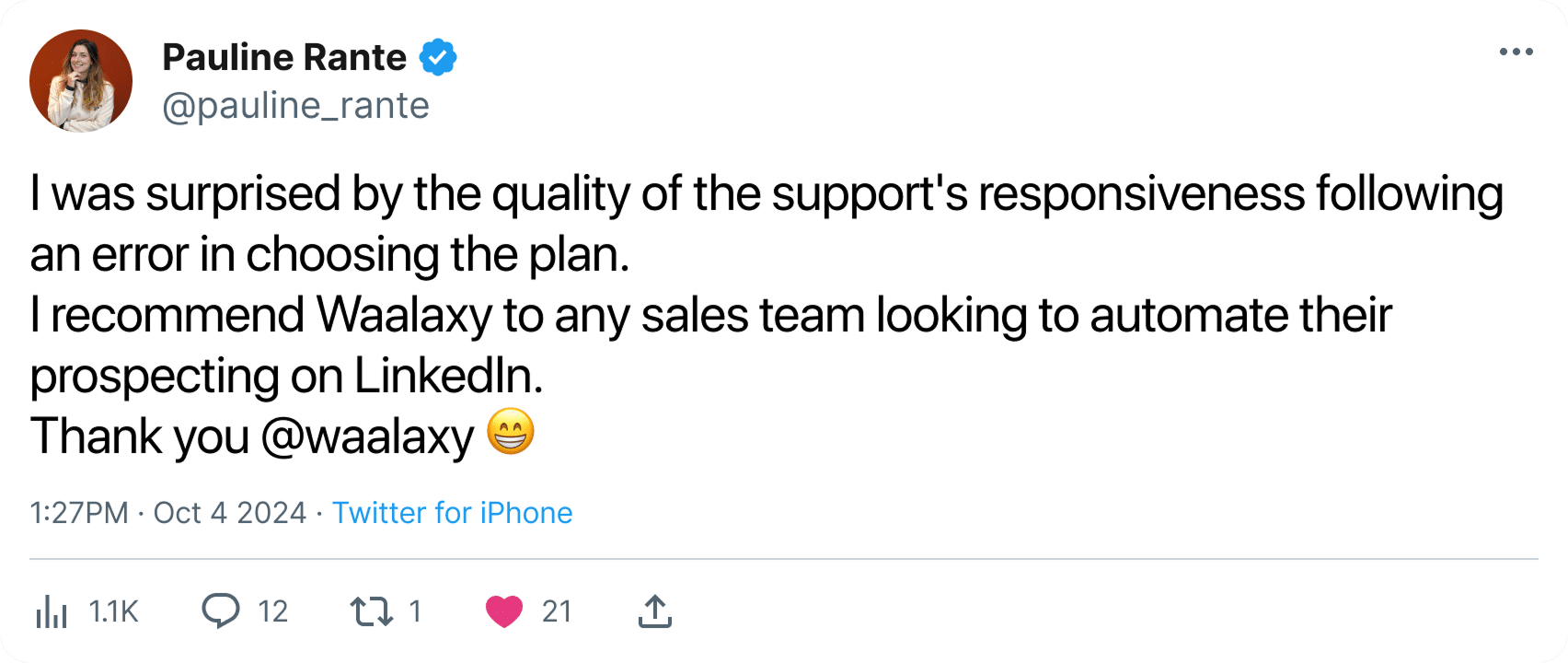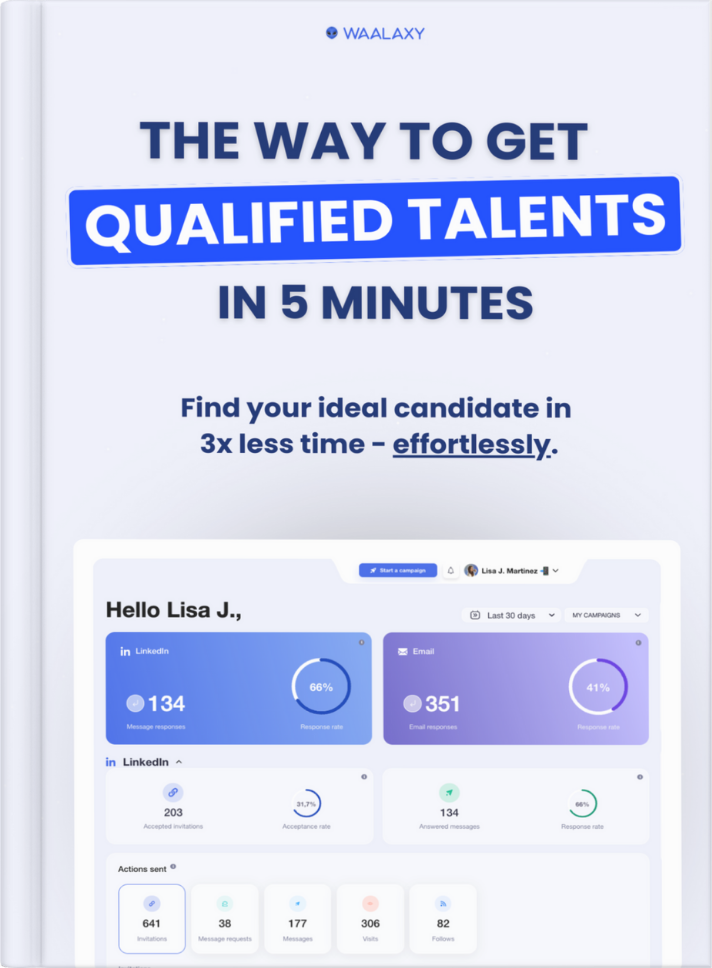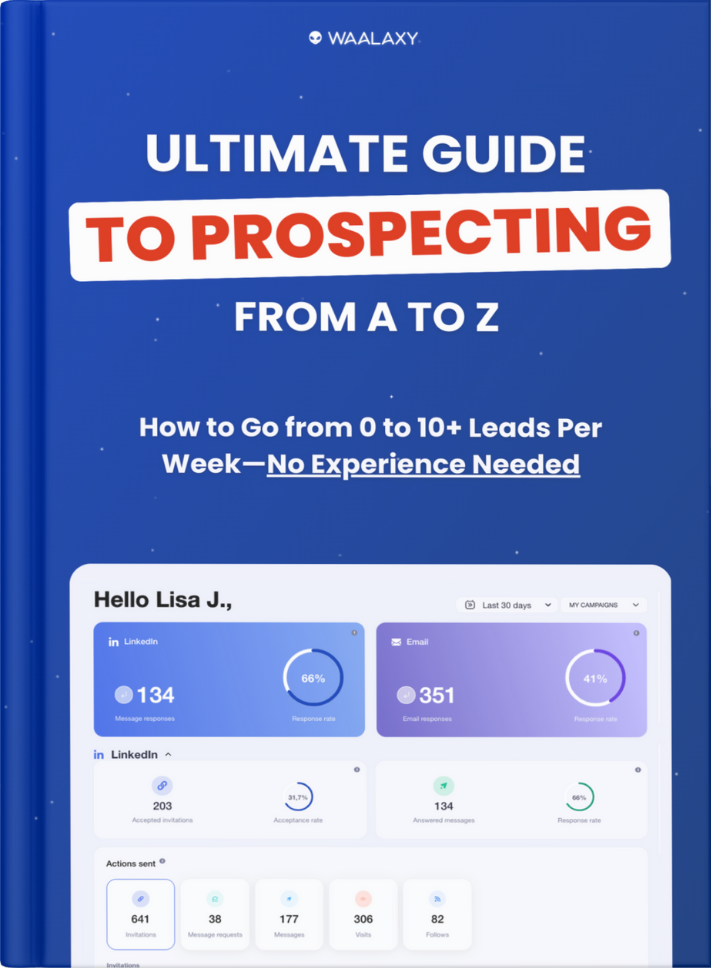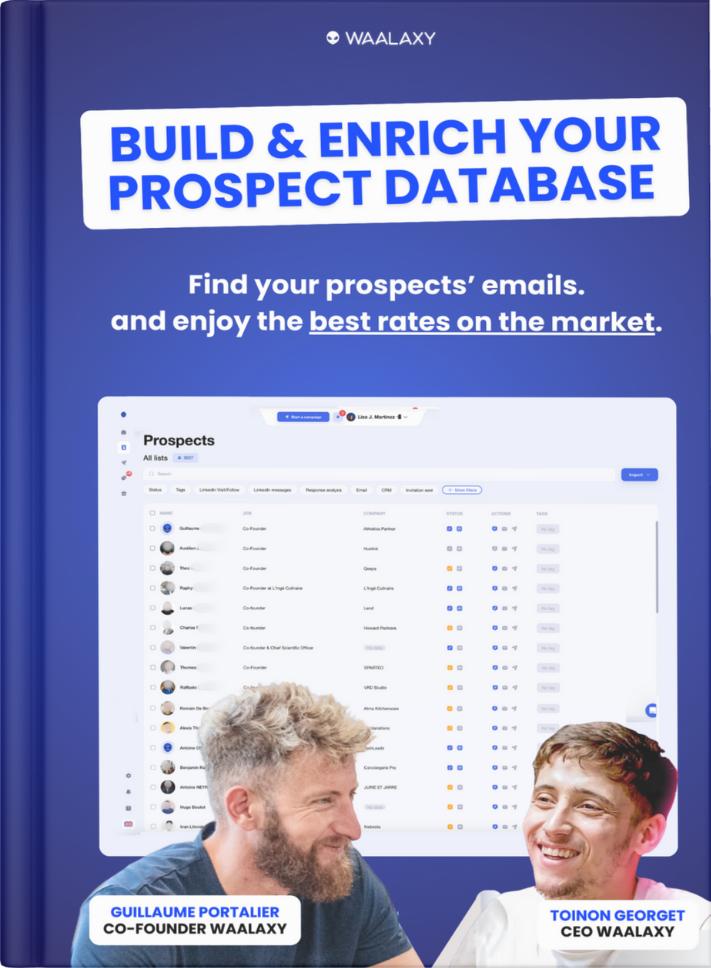Looking for THE BEST sales discovery questions? 😲 Don’t panic!
In this article, you’ll find 30 examples that will help you in your sales negotiation. 🙌
30 Sales Discovery Questions for Sales
To master the sales strategy, you must first ask the right discovery questions for sales. 🤓
Whether you’re new to sales or a sales team leader looking to add a new resource to your team, this list of questions to ask potential customers will help you better determine their needs. 🔍
Thanks to this initial discovery phase, you’ll be able to tailor your sales presentation email and negotiations to the needs of each B2b prospect. 👇
5 Types of Questions to ask a Client
Here are 5 types of questions have to ask your clients to sell. 💡
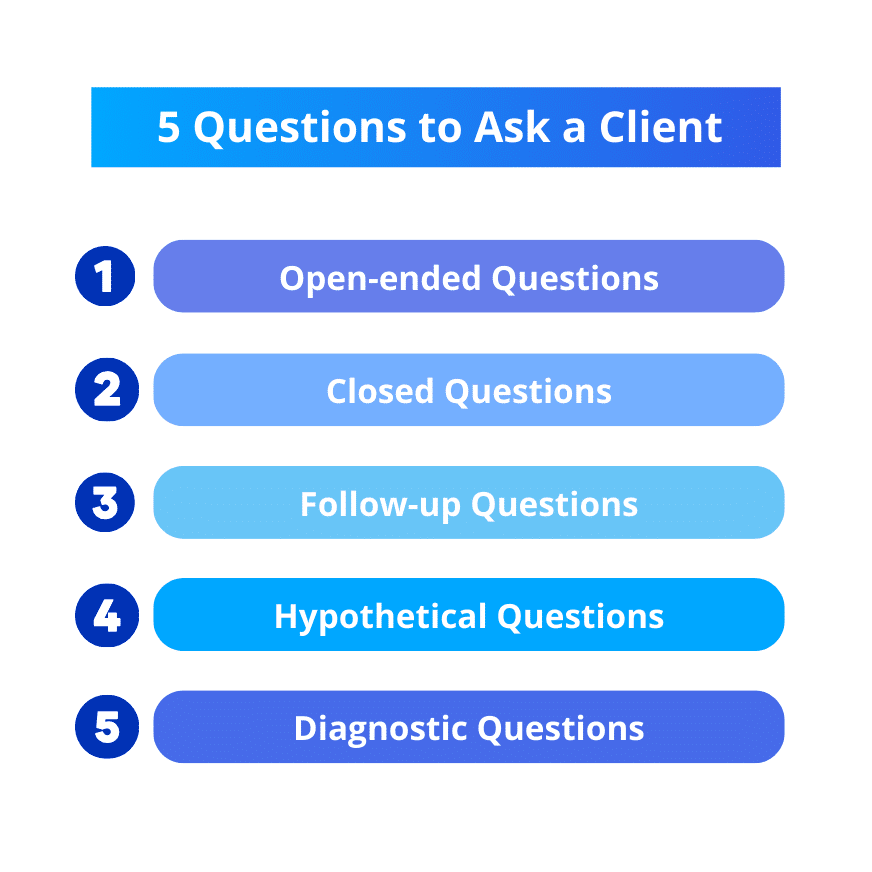
We explain how to ask the discovery questions right away! ⏬
What questions to ask during the discovery phase?
1. What are your short-, medium- and long-term objectives?
Firstly, asking this question will help you understand what your customers’ real expectations are, and how your product or service can help meet those expectations now or in the future. 🔮
2. Why is this purchase important to you? And for your company?
By answering this question, your prospect explains how they think your product or service can help solve the problem they’re facing. 🤔 You can then choose the model or package that best meets these needs.
3. How would you describe the potential of new products and services?
With this simple question, prospects can indicate which features are likely to interest them in your new product or service and get a clear idea of their expectations. 🎨
4. What can we do to make you pick us?
Use the answer elements in this question to highlight why your company is a better fit than your competitors, and how you can adapt your offering to better meet your prospect’s needs. 👍
5. What are your purchasing and satisfaction criteria?
Thanks to this question to ask a customer to sell, you’ll be able to understand what you need to include in your product or service to satisfy your potential customers. 😍
Find out how to optimize your CSAT (customer satisfaction rate)! ❤️🔥
6. What is most and least important when making a purchase?
Find out what your potential customer values most: price, quality, after-sales service, etc.? 🧐 You can then adjust your offer according to their answers.
7. What level of service are you willing to pay for?
Dig a little deeper… 🧑🌾 What is his maximum budget? What is the minimum service he expects in return? Now tailor your offer to your customer’s financial situation.
8. What do you like about your current supplier?
Your product or service must be able to satisfy potential customers to the same level as your competitors, or even more. 👀 Highlight what sets you apart and explain how your skills are better for winning their loyalty.
Find out what they don’t like about their current supplier. Would they be willing to change it for you? 😏
9. What would motivate you to change supplier?
Be direct with this question! 🏃 Depending on the answer, adapt your pitch and present the advantages of your product that may encourage the prospect to change supplier. This is your opportunity to bring him into your camp. ⚽
10. What do you expect from the companies you work with?
Make sure you’re providing a service that meets your prospects’ needs. 💡 You can use this question to determine the partnership expectations your prospects have.
11. What would you like to change in your current system?
If a prospect wants to change their current system, instead of proposing a similar solution, focus on enhancements and other complementary solutions that can be adapted to the prospect’s system. 🪄
Find out more about cross-selling here! 👌
12. What are your main needs?
Get straight to the point! 🎯 With this question to ask a customer to sell, you’ll be able to pinpoint the precise needs of your leads and which you’ll be able to meet.
13. Which needs do you think are the most important?
Ask for more details… ✍️ Make a list of the prospect’s needs so you can prioritize the services you offer, according to how significant they are to them.
14. What could I do to satisfy them?
This question is essential because you’re asking the prospect directly how you can solve his problem. 👉 He’ll either tell you again what the problem is. Or, he’ll communicate elements of what he’d like you to do to help him.
15. How can we work together?
This open-ended question will help you discover what factors the prospect is looking for, and whether they want to work with you or your company. 💁
If the prospect is still reluctant, work on the improvements he’s suggested and make a new prospecting plan. Come on, you got this! 💪
16. What do you expect from your relationship with a supplier or service provider?
Understand how the prospect hopes to interact with suppliers or service providers to directly adopt the type of collaboration that suits them. ✨ Make sure you tick the vast majority of boxes!
17. When can we work together?
Finally, think of this question to ask a customer to sell, so you can set a date to start working together. 🗓️
18. Would you be so kind as to tell me why you declined the offer?
Unfortunately, it can happen that your prospect refuses to work with you. 🙈 However, don’t hesitate to ask why.
It’s important to understand the factors that may have influenced the prospect’s decision to improve your offer and optimize the customer journey.
19. How can we work together in the future?
Ask your prospects what improvements you need to make to your product or service to close the deal next time. 🙏
20. During our past exchanges, what struck you the most?
This question not only helps you identify your strengths, but also subtly reminds your prospects of them. 🫡 Use these answers to highlight these strengths in your customer testimonials.
21. Who’s the best salesperson you’ve ever met?
With his answer, he can give you some examples of behavior he appreciates in a salesperson. 👉 This way, you’ll know how to strengthen your sales relationship with the prospect.
22. When can we talk again or meet?
Finally, this last question is essential for maintaining lasting business relationships.
23. On a scale of 1 to 10, are you satisfied with our product? Why or why not?
This question allows you to quickly assess whether your customers are satisfied with the products you sell. 🤫 Be a good listener and adapt your approach according to the customer’s rating.
Whatever their opinion, it’s important to gather detailed information, especially when it comes to an unhappy customer. 😓
24. What are the advantages and disadvantages of our products and services?
Similar to the previous question, this question helps you understand customers’ expectations of your company’s products and services. 👂
25. What do you like about our products and services?
Once you know the answer, you can identify similar products and services that you can sell to your existing customers. 🧠
26. Would you recommend our products/services to a friend or colleague?
The answer to this question will not only help you understand how satisfied your existing customers are 📏 but also whether you can see them as brand ambassadors for your company.
27. How do you use our products in your company?
This question is critical, ⭐ because all the previous answers must be questioned if the product is not actually used by the company’s employees.
Find out how to improve your client onboarding here! 👈
28. Do you think you received satisfactory customer service?
A company’s customer service is crucial to customer satisfaction, and if the customer responds in the negative, you need to find areas for improvement. ✍️
You can send them a customer satisfaction survey to find out more. 🤔
29. What do we need to do to continue working with your company?
This question will help you identify potential improvements your company has to make when renewing existing contracts. 🤗
30. Would you be willing to extend your contract today?
Finally, please ask this question to a customer to sell, only if you have received positive answers to the last sales discovery questions. ✔️
For more tips, read our article on client retention. 💝
What are the open questions in sales?
What’s more, you have to know that an open-ended question is one that can’t be answered with a simple yes or no. 😋 The 5Ws method of questioning usually starts with words like “what”, “why”, “how” or “tell me about X”.
👉 This encourages customers to provide more details and helps you to better understand their needs and preferences.

What is a closed sales question?
Closed questions, on the other hand, are sales discovery questions, which they can answer with a simple “yes” or “no” or a short sentence. 😬 They often start with actions like “it is true that”, “are they”, “do you want” or “do you have”.
✍️ Closed questions can help you gather specific information quickly, but they don’t allow you to understand your customers’ needs and preferences as well as open questions.
Conclusion: What are discovery questions in sales?
Asking the right questions is essential to sales success and helps you understand your customers’ needs, build lasting customer relationships and close more deals. 🤝
By combining open and closed questions, you can gather valuable information about their goals, preferences, and weaknesses. Remember, too, to tailor your sales pitch to each customer’s specific situation. 🎯
Here’s a recap of the sales discovery questions asked in this article: ⏬
- What are your short-, medium- and long-term goals?
- Why is this purchase important to you? And for your company?
- How would you describe the potential of new products and services?
- What can we do to make you choose us?
- What are the purchasing and success criteria?
- What do you think is most important and least important?
- What level of service are you willing to pay for?
- What do you like about your current supplier?
- What motivated you to change suppliers?
- What do you expect from the companies you work with?
- What would you like to change in your current operation?
- What are your main needs?
- How significant are they?
- What would you do?
- How can we work together?
- What do you expect from your relationship with a supplier or service provider?
- When can we do it?
- Can you tell me why you declined our offer?
- How can we work together again?
- What’s the most memorable thing we’ve ever done?
- Who’s the best salesperson you’ve ever met?
- When can we talk again?
- On a scale of 1 to 10, are you satisfied with our product? Why or why not?
- What are the advantages and disadvantages of our products and services?
- What do you like about our products and services?
- Would you recommend our products/services to a friend or colleague?
- How do you use our products in your company?
- Do you think you received very satisfactory customer service?
- What do we need to do to continue working with your company?
- Are you ready to extend your contract today?
Whether you’re at the beginning of the sales process or trying to close a sale, these questions will help you discover your customer and increase your chances of closing. 👏
Remember that the key to a successful sale lies not only in presenting your product or service, but also in establishing a relationship of trust with your customers. 🤗
So the next time you have a sales meeting with a potential customer, try asking some of these sales discovery questions to create a personalized customer experience. 💘
FAQ: Discovery Questions in Sales
What is the customer discovery phase?
The customer discovery phase is a critical step in the sales and customer relationship management process:
- This involves collecting detailed information about potential customers to better understand their needs, challenges, goals and business context. ✍️
- This allows companies to personalize their approach and offer solutions and products that meet the exact needs of their customers. During this phase, open-ended strategic questions are asked to encourage customers to share important information. ⚡
- This may include details about your current process, problems you encountered, what you like about your existing solution, and what you would like to improve. 💘
The goal of discovery phase questions is to build trust with customers by deeply understanding their problems and positioning the company to best meet their specific needs. ✅
We’ll reveal a few questions you can ask, right after! 👇
What discovery questions should you ask a customer?
When you meet prospects, it’s important to identify their exact needs and expectations, so you can provide them with a customized solution. 👽
Here are three examples of discovery questions for sales:
- What are your short- and long-term objectives? This question will help you understand your customers’ needs and tailor your offer accordingly.
- What challenges are you currently facing in your business? Identifying the challenges your customers are facing gives you the opportunity to propose targeted solutions that respond directly to their problems.
- How do you measure the success of our services? This enables us to define clear performance measures and align expectations, guaranteeing a fruitful, results-oriented collaboration.
These questions promote effective communication and create a basis of trust between service provider and customer. 🗣️ It’s essential for successful sales!
What are the 5 types of questions?
To prospect effectively, it’s essential to master the different sales discovery questions to ask customers and to fully understand their needs. 🫶
Here are the five main types of questions to ask your customers:
- Open-ended questions: “Can you tell me about a specific challenge your company is currently facing?” ⚡ In this way, you invite your customer to share more information.
- Closed questions: “Do you currently use a customer relationship management (CRM) solution?” These questions will give you a concise, precise answer. 📍
- Follow-up questions: expand on your previous answer by saying, for example: 👉 “You mentioned a decline in sales. What strategies have you considered for this?”
- Hypothetical questions: “If you had infinite resources at your disposal, what would be your priorities for improving your sales process?” ♾️ These questions reveal your aspirations and priorities.
- Diagnostic questions: “What criteria do you use to evaluate the performance of your current suppliers?” 🪶 These will help you understand your customers’ decision-making criteria.
These different types of questions ensure a comprehensive and focused exchange. 🏹 This is essential for identifying sales opportunities and building strong relationships with customers.
What mistakes should you avoid when asking open-ended questions?
When asking lots of open-ended sales questions, you can avoid making these common mistakes: 👇
- Answer your own questions.
- Not paying attention to customer responses.
- Conducting an interrogation instead of starting a conversation.
- Asking too many “Why” questions and not paying attention to tone.
- Giving solutions too quickly.
Finally, leave a little time between each question so that the prospect can reflect on his answers and better express his needs. ⛅
Now you know THE BEST sales discovery questions. 😉


